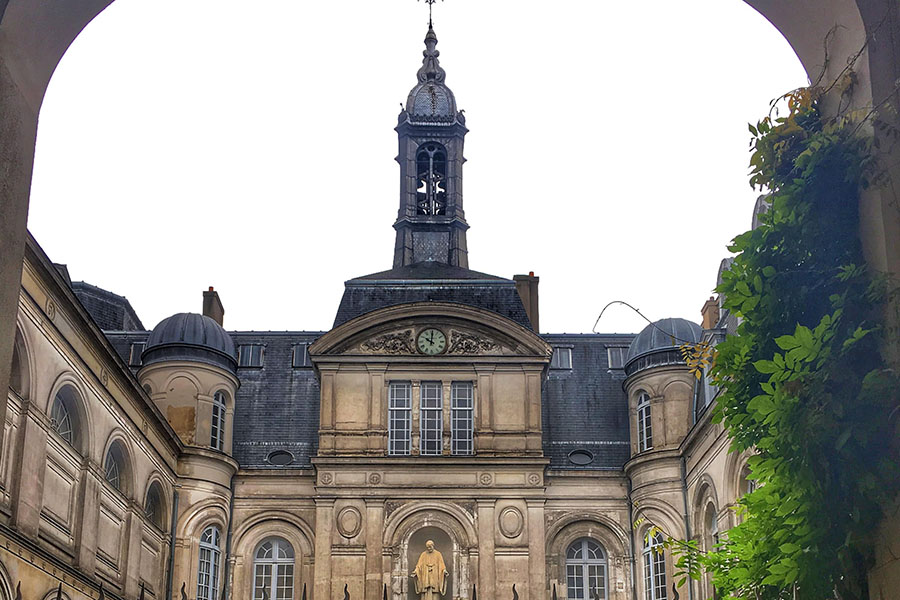 Faculty and staff who take the Vincentian Heritage Tour visit the mother house in Paris, where there is a museum featuring a collection of St. Vincent de Paul’s personal items. (DePaul University/Denise Mattson)
Faculty and staff who take the Vincentian Heritage Tour visit the mother house in Paris, where there is a museum featuring a collection of St. Vincent de Paul’s personal items. (DePaul University/Denise Mattson)More than 750 members of the university community have journeyed to Vincentian France since 2000, when DePaul began guided study tours of sites associated with St. Vincent and St. Louise. The trips are designed to prepare lay people to carry forward DePaul’s Catholic, Vincentian mission and have been an integral part of recent strategic plans, including the latest one, Grounded in Mission.
“The experience further cemented in me that we are not just employees showing up to a worksite,” says Victoria Van Kirk, assistant director of Housing Operations. “We are a community connected to a larger purpose, mission and commitment to serve.”
DePaul President, A. Gabriel Esteban, Ph.D., traveled last June with the
Vincentian Mission Institute cohorts from DePaul, St. John’s University and Niagara University. He says Vincent’s leadership and administrative approach made a significant impression.
“I learned so much on the trip,” he told managers in the Leading People at DePaul program. “St. Vincent was a gentle leader, and he often advised others on how to lead in a positive way. In this regard, I consider myself to be a gentle leader. I listen. I reflect. I trust my top advisors and appreciate their expert recommendations.”
Before enrolling in the VMI, Dorothy Kozlowski, interim dean of the College of Science and Health, was not aware of the Church’s or Pope Francis’ stance on scientific topics such as climate change and biomedical research.
“I was very surprised when I read '
Laudato Si,' an encyclical letter that translates to ‘On Care for our Common Home,’” she says. “This letter demonstrated a significant understanding and respect for science as well as a call for us to be mindful of our impact on our home, the earth. I think this is something science students at DePaul should be aware of as part of their education.”
Participants in the two-year VMI program complete a research paper and project advancing the university’s mission in some way. Kozlowski’s cohort is indexing the many educational opportunities available to students, faculty and staff who aim to ensure DePaul’s defining characteristics are preserved and shared with future generations. The team expects to identify ways to spread this knowledge at all levels of the university.
Regularly noted is the Rev. Edward Udovic, C.M.’s, understanding of the history and politics of 17th century France and his ability to convey it during tours.
“Fr. Ed is a great historian, and the Vincentians emphasize that St. Vincent de Paul was a Catholic priest first and foremost,” Dr. Esteban says.
Father Udovic’s descriptions of the gender and power dynamics of the era also gave Dr. Esteban a deeper appreciation of Vincent and Louise’s interdependence, such as Vincent’s support of Louise’s experiment in gathering young women together to serve the poor. This effort led Louise and her followers to the foundation of the Daughters of Charity, the first successful community for women to serve unbound by the restrictions of the cloister.
“Since returning from the trip, I’ve also shared information about Vincent with people outside the university,” says Scott Gabbert, a senior academic advisor in the School for New Learning. “They were marginally familiar with the root of DePaul’s name, but don’t know who Vincent was and how his life has meaning today.”
Inside the university, the institutional Climate Survey has indicated high levels of mission understanding and resonance among employees. However, there is room to improve because those levels are not consistent across all groups. The strategic plan includes new efforts to deepen our commitment to our Catholic and Vincentian mission.
“I’m no longer thinking of my work as work ‘in this moment,’ but instead as a connection to what Vincent and Louise did and would have expected,” Van Kirk Pride says. “I and my VMI colleagues have an obligation to share our broadened perspective with others through our work.”
So is the trip to France simply the best perk in higher education or does it have a lasting impact on participants and their jobs at DePaul? Gabbert is in the latter camp.
“The most profound portion of the trip was visiting the parish in Folleville where, on January 25, 1617, Vincent’s life began to change after his sermon,” Gabbert says. “To stand where he stood and imagine what happened leading up to that day, with the conversations he had with Madame de Gondi about ‘What must be done,’ and how all of that still has meaning today at DePaul University, resonates most with me. What we do on a daily basis has its origins on that day and in that humble location.”